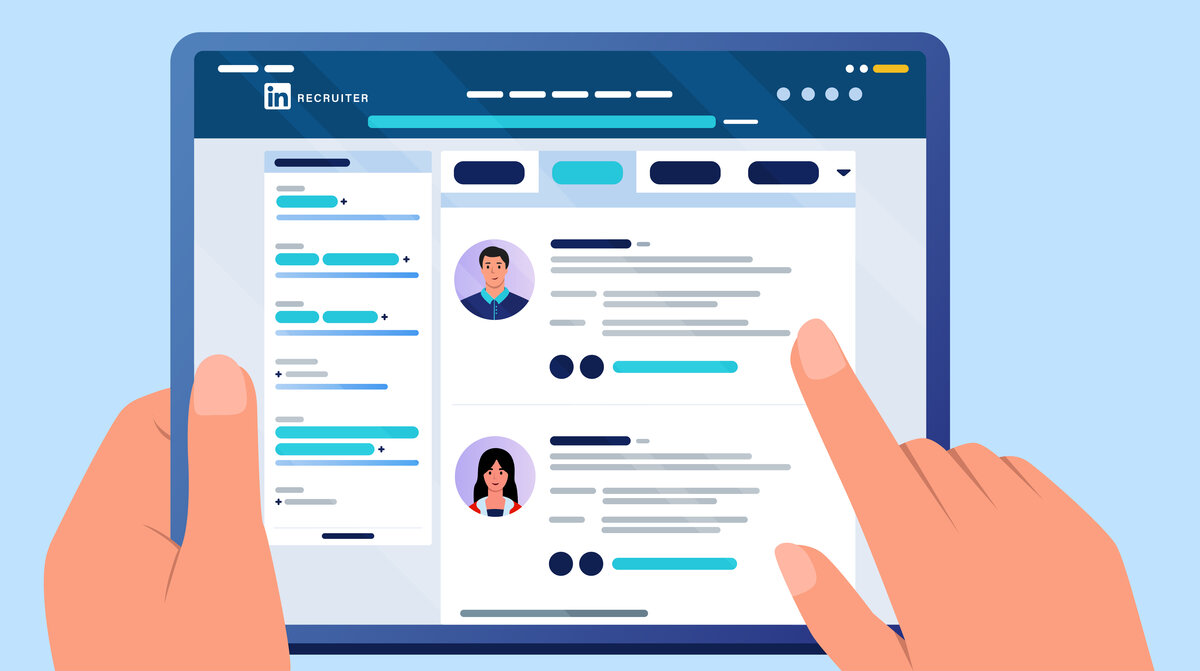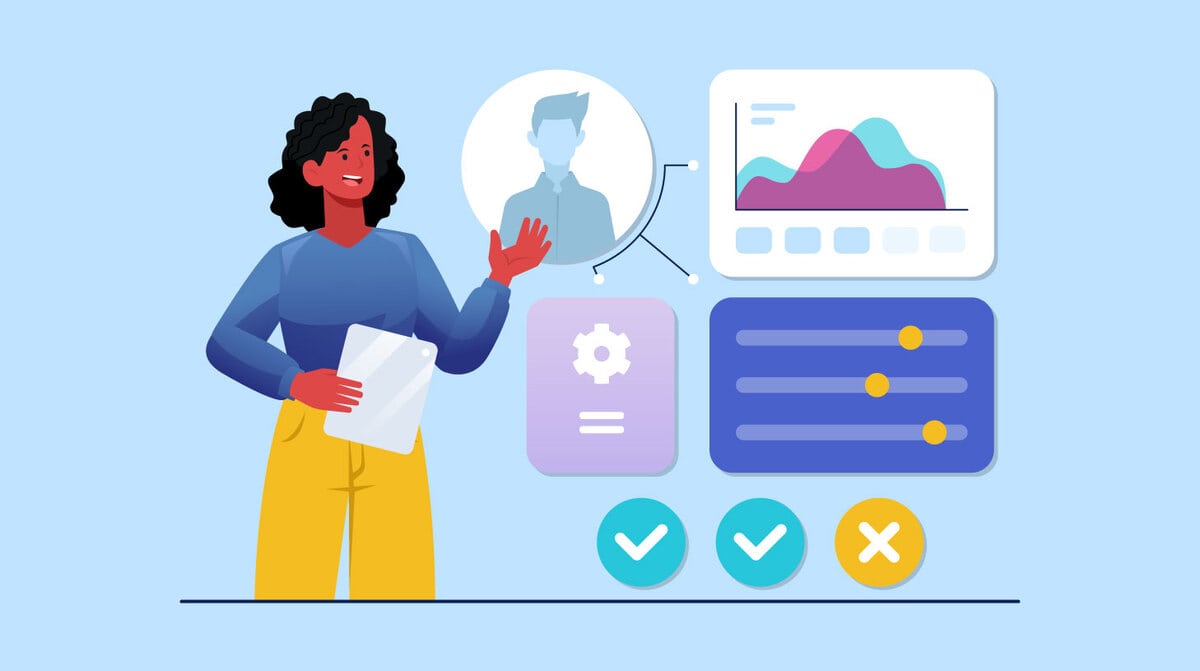Over many years of consulting with companies on their hiring processes, we have witnessed how structured interviews can lead to more efficiency and better overall hires. They lead to reduced turnover, improved performance, and a more engaged workforce.
However, my experience is that many hiring managers stick with unstructured interviews because they just haven’t been trained in the “whys” and “hows” of structured interviewing.
After all, hiring managers are busy people — with hiring and interviewing just one small part of their day-to-day responsibilities.
That’s it.
As you can imagine, a structured interview can take many different forms. But the key is that they are planned and consistent.
Most structured interviews rely heavily on behavioral questions designed to evaluate the core competencies for the job.
However, you are not limited to behavioral questions.
And the degree of structure can vary too.
Some organizations are very strict and pre-determine all questions and follow-up questions.
Some organizations use only behavioral questions.
Most companies try to strike a balance, creating structured interviews with a bit of room built in for interviewers to vary follow-up questions when appropriate.
This is primarily because there are situations that call for following up on specific aspects of an individual candidate’s background or skill set.
4 Benefits of Structured Interviews
Because of their strategic nature, structured interviews have a few advantages. Let’s take a look at a few of them:
#1 Benefit: Quality of Hire
First and foremost, structured interviews empower you and your team to make better hiring decisions:
- You’ll get more relevant and reliable information about candidates and you’ll use your interview time more effectively;
- Your questions and scorecard will be based on a strategic analysis of the most important requirements for the position.
And because of the pre-defined criteria and questions, you can be certain you are judging candidates based on sound standards.
When you sit down to make a hiring decision, you can see how candidates compare on the most important issues using real data. You can compare the data from multiple interviews and interviewers in a systematic way. And over time, you can use hiring data to continuously improve your processes, questions, and criteria.
#2 Benefit: Fairness
This is another big one:
In a structured interview, every candidate has the exact same opportunity to showcase their skills and experience.
All are asked the same questions in the same order and then scored by the same standards.
This levels the playing field by leaving little room for bias.
It also reduces the likelihood of mistakes based on inconsistent approaches — different interviewers, different moods, variance in time and attention on different days, etc.
#3 Benefit: Legal Issues
This attention to fairness will also help you in reducing your risk of running into legal problems based on perceptions of bias or discrimination.
Structured interviews force all interviewers to stick to appropriate questions and hiring criteria.
And you will have the documentation to show that you asked only job-related questions and evaluated only job-related characteristics.
#4 Benefit: Practicality
Once you’ve put a bit of time into the strategic planning up-front, structured interviews will make your hiring process more efficient long term:
- You don’t have to start from scratch with every new job opening.
- You greatly reduce the amount of prep you need to do for each interview.
- And you can refine your technique over time based on results you can track.
No more having to wonder about what you did right when a hire is a success. You can reproduce that success consistently in the future.
How to Make Your Interview Structured?
OK, so how do you put those great systems in place to improve results, reduce bias, and increase efficiency?
Maybe you are already using some structured techniques in your interviews. Or maybe you’re new to the idea.
60 percent of 158 reviewed cases of hiring discrimination involved unstructured interviews
Source
Whatever your experience level with structured job interviews, here are the primary components to consider when designing a structured interview experience:
#1 Develop a Position Profile
The number one way that interviews go off the rails is by not having clear prioritization of what the most important qualifications are needed to excel in the role.
Without clearly defining what the role needs, you risk conducting an interview that’s all over the place, asking general questions that don’t help you hone in on the best hire, miss red flags, and focus on the wrong things.
Think critically about your key priorities so you can spend your valuable interview time on getting the information you need most.
#2 Select Effective Questions
There are so many possible interview questions you can ask. And even more “advice” articles on which ones you should be focused on. It can be very overwhelming to try and figure out your list of the most effective questions to ask.
Writing your position profile will help you narrow down the essential skills you need in the job role.
Once you have that in hand, you can start to be more focused on what questions to ask.
The primary types of questions you can choose from include:
- Opening Questions
These are the questions you use to open the conversation and set the tone for the rest of the interview.
A lot of interviewers love asking, “tell me about yourself,” or “walk me through your background” to start the interview off.
These questions are very open-ended and can lead the conversation anywhere–especially if the candidate is not well prepared or is having trouble staying focused on answering the actual question.
However, they are also a good way to begin because it gives the candidate the opportunity to give you an overview of their background and skills in their own words.
- Behavioral Questions
Behavioral interview questions are usually the most effective type of questions you can ask.
They are the questions that begin with, “tell me about a time,” or “give me an example of.”
Behavioral questions are effective in terms of getting useful information about a candidate’s past experience, including approach to work, decision-making style, and work values.
They help you get illustrations of competencies that the candidate claims to have, which is extremely useful when trying to narrow down the candidate pool.
- Hypothetical Questions
Hypothetical (or situational) questions propose a hypothetical scenario and ask the candidate to describe how they would respond.
For instance, “How would you handle a rude and demanding customer?”
You might get some good information about the candidate’s ability to deal with pressure and conflict from hypothetical questions. Additionally, you can get a better understanding of how they think through issues and problem solve.
- Resume Questions
There are some standard resume questions that you’ll likely want to ask all candidates.
For example, something like “What were your proudest accomplishments in your last role…”.
This gets right into the high points of particular job experience.
Or
“What made you decide to leave Job X for Job Y?”
Additionally, you may want to ask about career changes, unusual experiences, or anything else that appears a tad unconventional. This brings us to Red Flag questions.
- Red Flag Questions
There are times when you need to ask a follow-up question about a potential red flag.
In this context, we define “red flags” as any signs of potential warning or risk. Anything that indicates that this candidate could be a risky hire for this position. Red flags could be related to skills, experience, attitude, reliability, or truthfulness.
For instance, “Can you tell me more about this gap in your employment history?”
- Technical Questions
For some roles, it will be important to dig into technical skills to ensure the candidate is qualified.
In some industries, technical skills are verified in initial screening interviews, through skill assessments, or separate technical interviews.
But hiring managers will sometimes want to ask questions to ensure technical skills are at the right level for the job.
For example, you may want to ask something like, “Can you tell me more about your proficiency with Microsoft Project?” or “How did you utilize InDesign to Complete Project X?”
- Career-Goal Questions
Asking questions about career goals will help you understand how this position fits into a candidate’s long-term objectives.
46 percent of Millennials left their last job due to lack of career growth.
Inc.com
These questions can help you identify which candidates are good long-term bets, with goals that align with your goals for the position and the organization.
The best-known version of this question is, “Where do you see yourself in five years?”
- Culture-Fit Questions
Some interviewers like to ask questions about a candidate’s outside interests or personal qualities to determine cultural fit.
These can sometimes be useful but should be approached thoughtfully.
Even well-intentioned interviewers can be biased toward candidates they find it easier to relate to, which can lead to poor, and sometimes even unlawful, hiring decisions.
#3 Create Your Interview Scorecard
An interview scorecard is any evaluation tool used to rate candidates consistently as part of a structured interview process.
Scorecards can take many forms from the simple to the complex.
At a minimum, a scorecard lists the top areas for evaluation with a numerical rating scale for each, along with space for an overall candidate rating and notes.
What your scorecard will look like will depend on your organization and the priorities of the hiring professionals who design them.
However, whatever elements you include, your scorecard will provide focus and consistency and help you make a more data-based decision on who is the best fit for the job.
CONCLUSION
And those are the key steps to take you from an unstructured interview to one that is structured, well-organized, and fairly evaluated.
You can become a structured interview master by developing a more thorough and strategic Position Profile, using that to define more effective interview questions, and tying everything together with a reliable scorecard.
Give it a try and you’ll see the benefits immediately in both the process and your results.
Have you had success with structured interviewing? What worked for you? What aspects of the interviewing process became better or more efficient?
Leave a comment and tell us your story!





